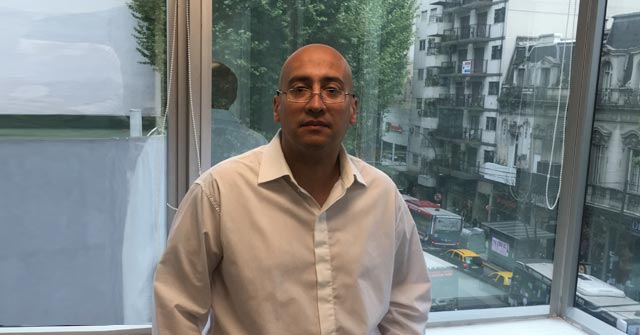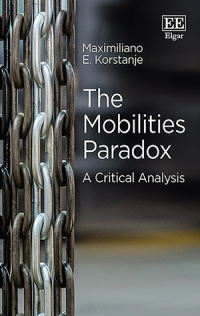Critical Pioneers: The Short Interviews Season - 1. M.E. Korstanje
During June and July 2021, the Northern Notes Blog, a blog published by the School of Sociology and Social Policy at the University of Leeds is recruiting international scholars who have published an outstanding book or a collection of academic papers in the field of tourism mobilities and critical tourism analysis. By both endorsing critical theoretical scholarship and inviting innovation and critiques of critique, this summer the Northern Notes Blog invites cross and trans-disciplinary dialogue in tourism analysis.

Interviewed scholar: Maximiliano E. Korstanje, Associate Professor, Department of Economics, University of Palermo, Buenos Aires, Argentina (mkorst@palermo.edu).
Theme of interview: The Mobilities Paradox: A Critical Analysis, New York: Edward Elgar, 2018.

What is the central argument in your book?
The Mobilities Paradox is the title of a book I published with Edward Elgar in 2018. The book attempts to bring cultural studies –above all in the field of mobilities- and neo-Marxism into a dialogue, showing the complex dynamics of mobilities in the threshold of time. The modern nation-state imposed a closed form of mobilities but also domesticated the vagabond and the nomad. In my opinion, this point was systematically overlooked in classical Marxist works on mobilities.
The Mobilities Paradox starts from the premise we are not a mobile society, or a society characterised by high mobilities. The material asymmetries between the global North and South, which were well-documented and discussed by colleagues and experts, show that only a small portion of the entire world population is legally allowed to travel (to be exact less than 20% of humankind). Of a total of 8.000 million people only 1.400 million travelled annually (per reports of UNWTO 2018). This number represents 17.5% of the global population. At a closer look, the current technological breakthrough has accelerated the transport timeframe connecting cities in hours. There has been an increase in diseases such as heart attacks or brain strokes, obesity (only to name a few) from the lack of exercise, so we definitely move less physically. Here is where the paradox lies: we move less than in other centuries but move farther and of course faster.
Echoing Marshall McLuhan, who argued that technology is a sensory extension for humans, I examine how we use machines to move. This suggests that we are carried from here to there while we remain physically immobile – it is as if we live in The Matrix saga. Another important point, which I feel mobilities theory has not addressed, pertains to the history of the nation-state. The modern nation-state domesticated nomadic populations within its geographical borders to demarcate national identity. In so doing, the state allowed specific circuits to move. This is a “carrousel”, which gives a false sense of movement simply because we are turning round and round while we are always bound to the same axis. If you ask me, this is exactly that modern tourism emulates. The last issue that I explore in the book is how economic inequalities between developed and underdeveloped countries reflect the different travel bans and restrictions imposed upon “the undesired Other”. To cite Bauman, only the privileged classes are given the opportunity to travel. To illustrate this, I use the plot of the dystopian movie The Island (2005), which discusses the governing of life in a fictional community in which residents are cloned from wealthy sponsors. This organ harvesting system is based on the illusion that those who win the lottery are chosen to travel to a paradisiacal island.
What is, in your opinion, your work’s most important contribution to tourism studies? How does it relate to the theme of this interview?
I believe I have made two contributions to tourism theory, which feature in two different books: Terrorism, Tourism and the End of Hospitality in the West (Palgrave Macmillan), and the Rise of Thana-Capitalism and Tourism (Routledge). Scholars often worry about the rise and advance of terrorism as well as its devastating effects on the tourism industry. This seems to be true in some sense, but what is more important is that has turned into tourism by other means. In the colonial period, the Western civilization expanded through modes of paternalist ethnocentrism which cultivated the curiosity for the “Non-Western Other”. In the industrial period, hundreds of migrants, mostly anarchists, arrived in the US. During the nineteenth-century migrations to the US some anarchists targeted important police chief officers and politicians, succeeding to kill the US president William McKinley. Some members of these radicalized groups were apprehended, tried and exiled. Other groups opted to organize themselves into labour unions fighting for education and the worker’s rights. The latter groups successfully obtained important benefits for the workforce such as working hour reduction, better wages, paid holidays as well as the right to strike.
All these benefits paved the way for the rise of modern tourism. The system of tourism adopted the core value of equality from such anarchist ideologies but rejected all the elements promoting radicalization. Thus, I argue that from its inception, terrorism established a relationship with tourism that led to both being inextricably intertwined. The problem is that today terrorism is destroying one of the sacred tenets of the West: hospitality. The West rejects the “non-western other” because of fear. In the second book, The Rise of Thana-Capitalism and Tourism I hold that this lack of hospitality (i.e., the “other” is neglected), is demonstrated in the creation of the spectacle of disaster that uses the “other´s” pain to maximize our pleasure. Beyond forms of dark tourism there lies a type of morbid (sadistic) taste that characterizes the start of a new stage of capitalism: thana-capitalism.
What vision of criticality do you uphold in the published title(s)? Does your showcase work belong to a school of thought or a paradigm and why/how?
Mobilities theory has developed over the last two decades into a leading paradigm in the social sciences. One finds interesting books and studies in the field. The technological revolution facilitates faster trips, connecting remote places that would have otherwise been inaccessible to the classic traveller. The critical element of the book consists of going in the opposite direction, stressing the different landscapes between the Global North and the South. In The Autumn of the Middle Age, Johann Huizinga shows how the epic ideal of chivalry we find in medieval in poems, books and memories emphasised heroism, altruism and generosity, while concealing how the nobility inflicted violence upon the peasantry. This happened because ideology divides the cosmology of places in two parts: a fantasy which offers an embellished story of idealized events, and the reality which is often brutal and crude. One works in coordination with the other. Fantasy makes reality attractive to the human eye. I attempted to generate connections with mobilities theory on this matter: as I mentioned above, despite the increase of flights and travels, only 20% of us really move. Narratives act as an ideological instrument that can reveal things about what remains unsaid. Mobilities studies emphasize the fact we are moving but when I engaged with some critical voices such as Jean Baudrillard or Marc Auge, I understood why we move nowhere. This is the main vision of criticality I have: we need to examine the history of the modern taste, the cruelty in the methods with which nomad groups were domesticated by the new authorities. This helped the state to establish borders and invent ethnicity as an ideological form of belonging.
Is there an area in tourism scholarship that remains underdeveloped? Do you believe that you may have a role in its development?
I am concerned about the emergence of radicalized discourses, chauvinist and separatist expressions which mark what I dubbed as the end of hospitality, at least as we know it. Terrorism, in the context of 9/11 and the War on Terror declared by Bush´s administration paved the ways for a new culture of fear that promotes the neglect, if not eradication of “the other”. The same happens with the new COVID-19 pandemic. Just as in post 9/11 days anyone was suspected to be a potential terrorist, so in the post-COVID-19 context anyone can be seen as a potential terrorist as carriers of a lethal disease. This suggests that hospitality is in decline after 9/11. Also, I believe that far from being a foundational event, COVID-19 affirms a tendency to be inhospitable to the “other” that emerged with 9/11. Like terrorism, COVID-19 generates not only economic losses but also durable social effects such as the rise of geopolitical tensions and the feudalization of the world.
I am particularly interested in the ethical questions posited by the health passport. In medieval times, the passport would be issued to credit the traveller with an identity and identify their destination. Today at airports, travellers present their name and identity as well as their destination by presenting their passports. Classical passports are cultural constructions of our identity. After COVID-19 this construction is clearly being replaced by biological determinants. Health passports cannot be falsified, and travellers cannot lie about their health. The antibodies cannot be fabricated because they are biologically created. I beg the following question: do persons who are not vaccinated or do not want to be vaccinated have to be prevented from traveling? Is this the end of individual freedom and the right to free choice?
These above-formulated questions convey the inequalities between rich and poor travellers. I am inspired by Zygmunt Bauman’s work to discuss how poverty is replaced by a new gap between safe-vs-unsafe tourists. Money makes way to immunology. I will be working on this as well as on the problems adjoined to the feudalizing process accelerated by the coronavirus and the radical changes in travel behaviour that is undermining the authorities of nation-states in my next book.
